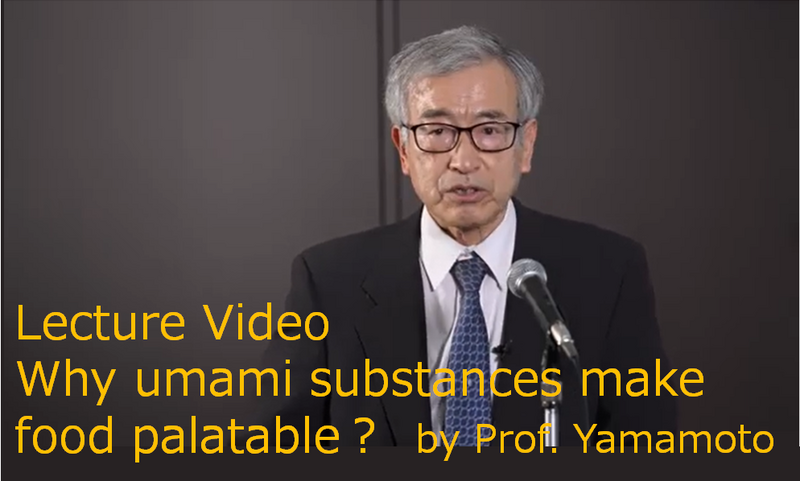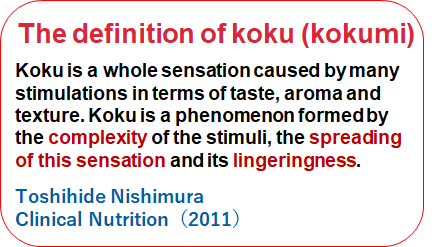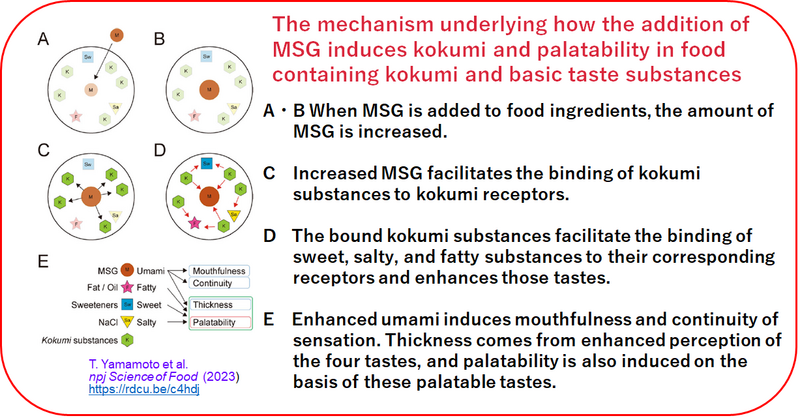New video - Closing in on the mechanism of how umami substances make food palatable
April 2023

Try adding a little umami seasoning to your food. It would make your food more delicious.
Many people including food scientists have experienced this while cooking. However, mechanism behind it remains poorly understood. Closing to the mechanism, the Umami Information Center (UIC) made a lecture video led by Dr. Takashi Yamamoto, the chairman of UIC and a professor at Kio University.
“Adding only small amount of umami seasoning makes the dishes dramatically tastier.”
“Umami seasoning has a salt reducing effect.”
“A bland food may change to rich one by umami seasoning”
“By adding umami seasoning the individual flavor of food become clear and rich in koku.”
These are the comments often heard from chefs and dietitians both in Japan and abroad who are talking about the effects of umami seasonings.
What happens when umami seasoning is added to food?
In this video, Professor Yamamoto provides a historical review of previous and recent studies on the characteristics and perceptual mechanisms of umami and kokumi and proposes an alternative notion regarding topic.
Since the discovery of umami taste by Dr. Ikeda in 1908, there has been a history of numerous studies that led to the discovery of umami receptors on the tongue in the 2000s, which provided a major opportunity for umami to be recognized worldwide as the fifth basic taste.During that period, various findings had been reported and data had been accumulated, including the discovery of other umami substances besides glutamate, the characteristics of umami substances represented by synergistic effects, and the functions of umami substances in foods.
“Umami substances are essential for the deliciousness of dishes. However, it is not a simple matter of adding umami taste to make complex food compound tastier." says Prof. Yamamoto. "Simple addition of umami taste to four other basic tastes does not affect the palatability of other basic tastes."
He suggests that the presence of "kokumi substances" in processed foods play a major role for effective working of "umami seasonings. And he introduces a study showing that when kokumi substances and umami substances are simultaneously present in complex food compounds, taste quality would be enhanced. In other words, overall taste intensity and flavor characteristics such as continuity, impact, roundedness and thickness have been enhanced to have kokumi.
When kokumi substances are present in complex food compounds, umami substances activate the action of kokumi substances, resulting in enhancement of the intensity of umami and other basic tastes, which will induce kokumi. Kokumi substances also enhance the intensity of umami and other basic tastes.
Therefore, what is important for sufficient palatability is a good balance of umami and kokumi substances. In this state, food tastes even better accompanied by aroma and texture.
Scientists around the world are paying attention to kokumi. However, the precise role of kokumi substances has not yet been elucidated. Further studies on the relationship between umami and kokumi will be expected in the future.
This lecture video is available on the UIC website as well as on our official YouTube channel. We hope this video will be widely viewed by researchers and students of culinary science and taste physiology, as well as by chefs and nutritionists.
How do umami substances make food palatable? by Professor Takashi Yamamoto, Kio University – YouTube (53min.)
https://www.youtube.com/watch?v=lE6EOZ6U47c


